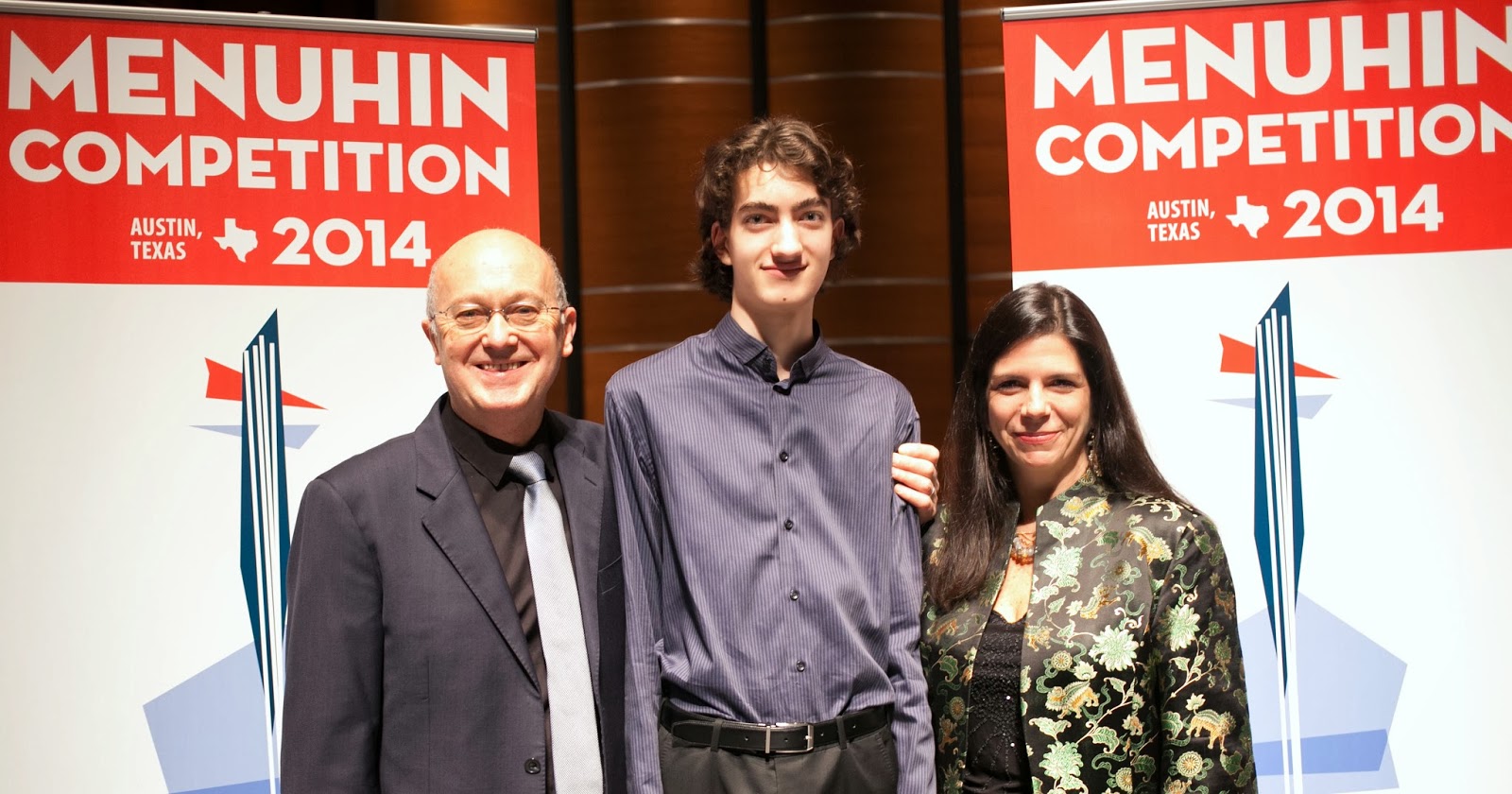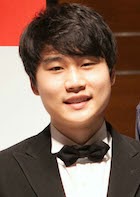 |
| (Left to right): Gordon Back (Artistic Director of the Menuhin Competition); Stephen Waarts (Winner); and Jury Chair Pamela Franks |
Mendelssohn: Violin Concerto in e minor Op. 64
Finalist: Christine Seohyun Lim (Age 19; American-Korean)
Prokofiev: Violin Concerto No. 1 in D major Op. 19
Finalist: Stephen Kim (Age 18; American)
Prokofiev: Violin Concerto No. 2 in g minor Op. 63
Finalist: Stephen Waarts (Age 17; American-Dutch)
Prokofiev: Violin Concerto No. 1 in D major Op. 19
Finalist: In Mo Yang (Age 18; Korean)
Austin Symphony Orchestra/Peter Bay
Long Center for the Performing Arts
Austin, Texas
March 1, 2014
After eight days of grueling competition, four young violinists between the ages of 17 and 19 faced off at the Long Center in Austin, Texas in concertos by Mendelssohn and Prokofiev. Each one of them well deserved to be there and the jury’s task was by no means an easy one. As jury chairman Pamela Frank said afterwards: “If there had been a different jury the results might have been different. And if the same jury had made a decision tomorrow the results might have been different.” Sitting in the audience I felt the same way; it was especially difficult trying to compare a performance of the Mendelssohn Violin Concerto with a performance of one of the Prokofiev concertos.
As we all know, there is no easy way to compare performers at this level. There are standards, of course, relating to whether a violinist is playing in tune or playing all the notes in a demanding passage. But the criteria are by no means solely technical. Yehudi Menuhin himself was a child prodigy and an amazing technician in his youth. As he got older, his technique became much less reliable; nevertheless, he was still regarded as one of the great violinists of his time for his other musical qualities. He had integrity, he had emotion and he had a rare insight into the interpretation of a vast range of pieces.
In the earlier rounds of the competition all four violinists who played tonight had shown that they could meet almost any technical challenge. Their musicianship was tested in other ways, for example,
when they sat in the first chair of the Miró Quartet to play Haydn. In this final round of the competition, they were called on to perform a complete concerto with orchestra. The set concertos from which they made their choices each demanded a combination of technique, tonal beauty and variety, emotion and maturity of interpretation, and all four finalists played well.
when they sat in the first chair of the Miró Quartet to play Haydn. In this final round of the competition, they were called on to perform a complete concerto with orchestra. The set concertos from which they made their choices each demanded a combination of technique, tonal beauty and variety, emotion and maturity of interpretation, and all four finalists played well.
In the end, First Prize went to Stephen Waarts, who had given a superb performance of Prokofiev’s Violin Concerto No. 2. No doubt about it; in every sense, this was a real performance and would be heartily applauded in any concert hall in the world.
Mr. Waarts plays with technical perfection and great beauty of tone. Although undemonstrative, he nonetheless has a presence on stage that commands attention. His playing soars over the orchestra when it needs to and is capable of reaching the back rows of the auditorium, a power that any musician considering a career as a soloist must have.
Waarts is already well on his way to building a major career and this victory in the Menuhin Competition will certainly add to the momentum. He is currently studying with Aaron Rosand at the Curtis Institute of Music, but he seems to be everywhere giving public concerts and winning competitions. Just last year he won the Montreal Symphony Orchestra’s concerto competition playing the Brahms Violin Concerto with Maxim Vengerov conducting. In 2010 he won the Junior Section of the Menuhin Competition. To learn more about this exceptional young man and to keep up with his career visit his website at www.stephenwaarts.com.
In addition to the hours he spends playing the violin and learning its repertoire each day, Mr. Waarts is also playing a great deal of chamber music repertoire, studying the piano and mathematics – a phenomenally gifted and energetic young man.
 |
| In Mo Yang |
While Stephen Waarts distinguished himself at this competition, so too did some of the other competitors. Second Prize was given to Korean violinist In Mo Yang. I must say that I found his performance in the Final Round even more compelling than that of Mr. Waarts. Yang projected an individuality, without exaggeration, that is very rare in competitions. In Prokofiev’s Violin Concerto No. 1, he had an uncanny ability to get to the essential character of virtually every episode in the piece. I found myself learning a great deal about the piece from listening to Mr. Yang play it. Mr. Waarts will surely make a big career; Mr. Yang may not be far behind.
 |
| Christine Seohyun Lim |
Finalist Christine Seohyun Lim studies at Curtis, and like Mr. Waarts, has done well in competitions around the world. She gave a beautiful performance of the Mendelssohn Violin Concerto and fully earned her Third Prize selection. I suspect that some jury members might have ranked her even higher.
Throughout the evening, the Austin Symphony gave very sympathetic support to each of the soloists and Peter Bay affirmed yet again that he is an accompanist of the first rank. The soloists are the stars in such an evening but as they will learn during the course of their careers, playing the great concertos is a collaborative effort requiring excellent orchestras and conductors as colleagues.
There is one more event left on the Menuhin Competition Austin 2014 schedule: the Closing Gala Concert. Both Junior and Senior Section First Prize winners will be featured as soloists, and one of the distinguished jury members, Arabella Steinbacher will play Ravel’s Tzigane. Giancarlo Guerrero will conduct the Cleveland Orchestra in Tchaikovsky’s Symphony No. 5. I’ll report on this event in my final blog from the competition.
Paul Robinson is the author of Herbert von Karajan: the Maestro as Superstar, and Sir Georg Solti: His Life and Music. For friends: The Art of the Conductor podcast, “Classical Airs.”














